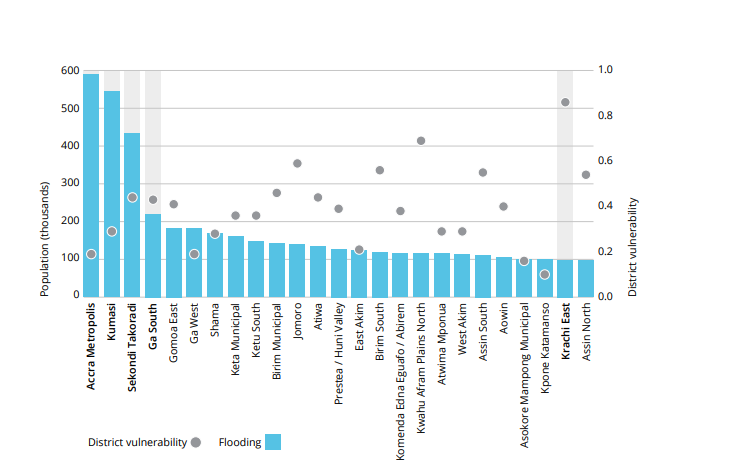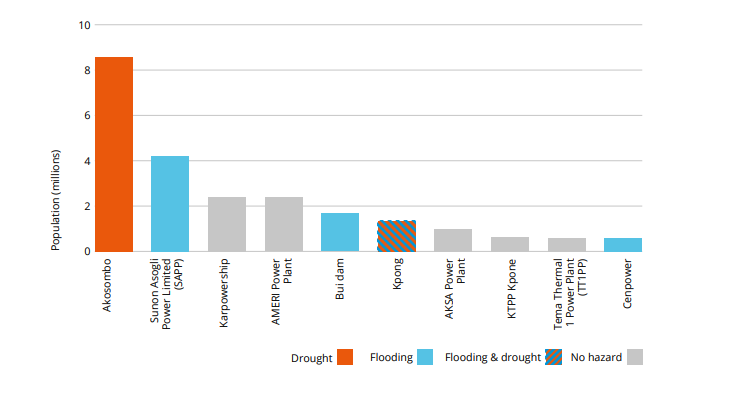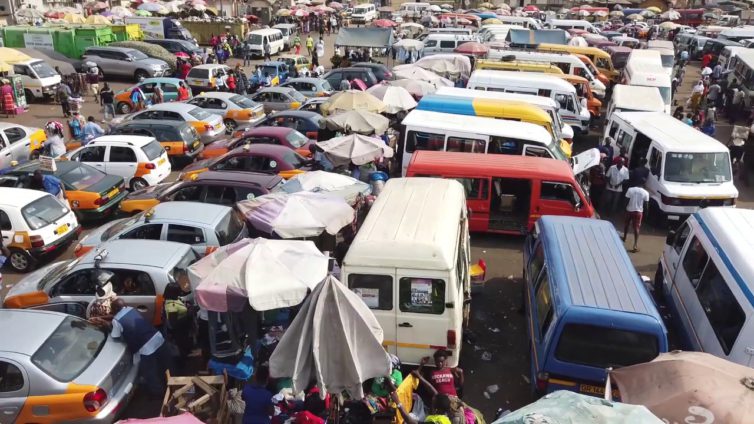A new report has estimated that road flooding could cause damages worth $3.9 billion to the Ministry of Road and Transport by 2050.
According to the study, the potential amount to be lost is thrice the US$1.3 billion investment made in the sector in 2019.
“Using assumptions on rehabilitation costs linked to road types, pavement conditions, and lanes, estimated damages can be calculated, amounting to up to 3.9 billion USD in damages on a national scale in a likely future flooding scenario,” the study noted.
The study titled, “Ghana: Roadmap for Resilient Infrastructure in a Changing Climate” was led by the Ministry of Science, Environment, Technology and Innovation in partnership with the Global Center on Adaptation.
It was based on an assessment of climate change threats to the energy, transport and water sectors.
The research which was conducted using a high hazard scenario, which they referred to as the highest likelihood of flood events found that five districts would be most exposed to road flooding by 2050.
The most-exposed districts; Accra Metropolis, Kumasi Metropolis, Sekondi-Takoradi, Ga South and Krachi East could have a population of 1,885,149 losing access to healthcare in the likelihood of flood events.

“The largest was seen in the Accra Metropolis district within the Greater Accra region, where the estimated damage losses exceeded US 130 million USD. Losses are also high in the Northern and Western parts of the country,” the report said.
In the energy sector, the study concluded that the Akosombo hydroelectric power plant with 1020 MW generation capacity and serving over 8.6 million people, will be affected by exposure to high drought intensity.
The Kpong dam can also be affected by drought hazards in addition to flooding, which can impact its 160 MW generation potential and the 1.3 million people it serves.
The Sunon-Asogli thermal power plant at Tema, which has a generation capacity of 560 MW and serves over 4 million people, is exposed to river flooding hazards and the 400 MW Bui dam is also exposed to river flooding.

It further indicated that the projected impacts of climate change could intensify the pressure on the country’s present dam infrastructure leading to severe consequences for river runoff, which could affect over 1.3 million people, mostly women and children.
However, the study proposed some interventions for addressing risks through targeted adaptation options in the built and natural environments, including nature-based solutions.
The study was carried out under the Africa Adaptation Acceleration Programme, a partnership of the African Development Bank (AfDB) Group and the Global Center on Adaptation, with support from the United Nations Office for Project Services, the United Nations Environment Program, and the University of Oxford’s Environmental Change Institute.
Latest Stories
-
ORAL: We won’t witch-hunt, we’ll focus on transparency, not revenge – Ablakwa
22 minutes -
Embattled Liberian speaker questioned by police over parliament fire
3 hours -
‘I won’t be a judge in my own court; ORAL is about protecting public purse’ – Ablakwa
3 hours -
Bawumia joins thousands in Kumasi for burial prayers for Ashanti Regional Imam
3 hours -
Blue Gold Bogoso Prestea Limited challenges government actions in court
4 hours -
Verdicts due for 51 men in Pelicot mass rape trial that shook France
4 hours -
Syria not a threat to world, rebel leader Ahmed al-Sharaa tells BBC
4 hours -
Patrick Atangana Fouda: ‘A hero of the fight against HIV leaves us’
4 hours -
Trinity Oil MD Gabriel Kumi elected Board Chairman of Chamber of Oil Marketing Companies
5 hours -
ORAL campaign key to NDC’s election victory – North America Dema Naa
5 hours -
US Supreme Court to hear TikTok challenge to potential ban
5 hours -
Amazon faces US strike threat ahead of Christmas
6 hours -
Jaguar Land Rover electric car whistleblower sacked
6 hours -
US makes third interest rate cut despite inflation risk
6 hours -
Fish processors call for intervention against illegal trawling activities
6 hours

